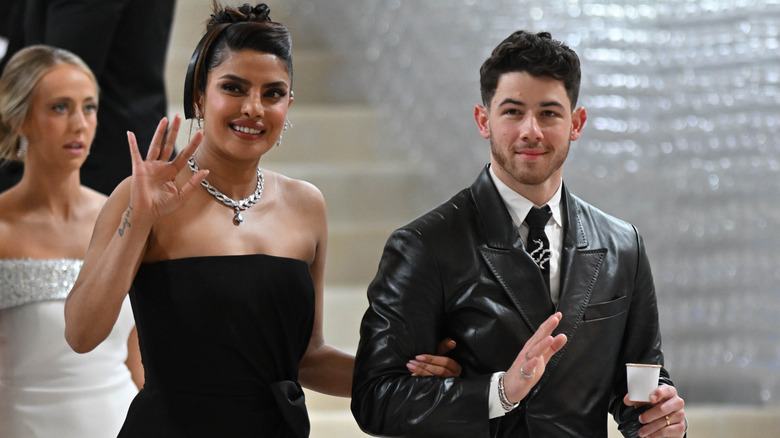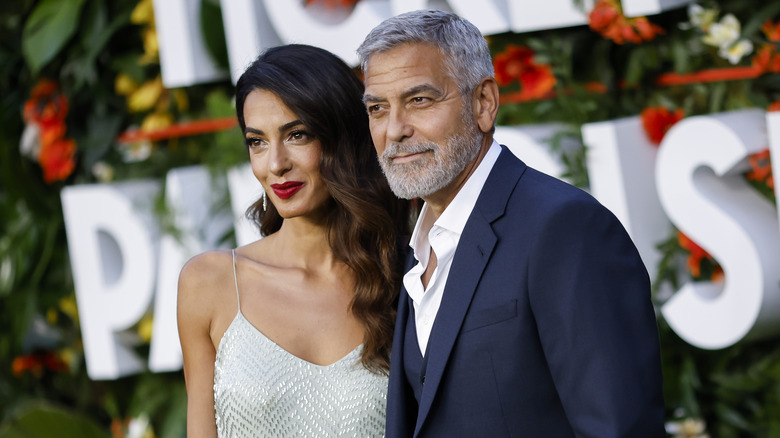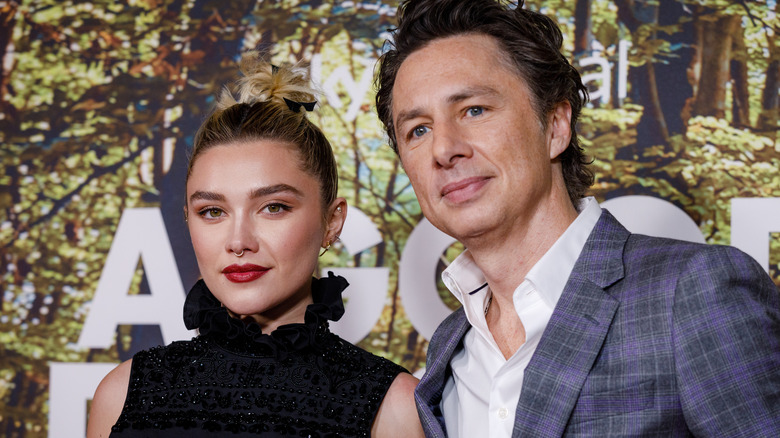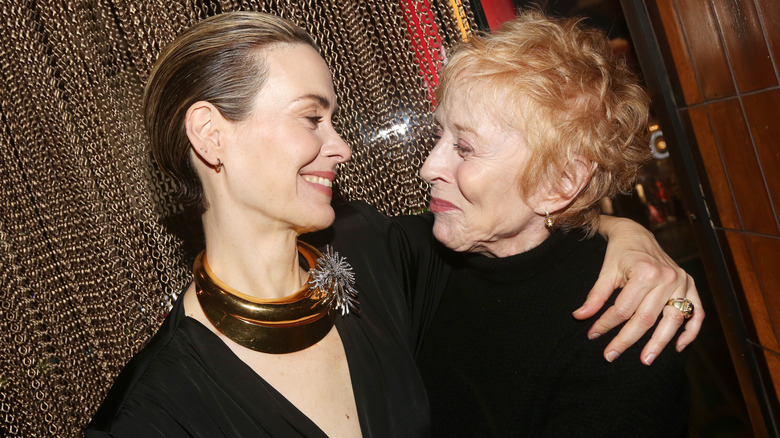The Best Age Gap For A Successful Relationship, According To Science
Few things get people talking quite like age gap relationships. Even in the 2020s, these pairings are still met with raised eyebrows despite the fact that in Hollywood, they're literally everywhere. Star couples like Amal and George Clooney, as well as Priyanka and Nick Jonas, have been in the spotlight for their age differences — we even see Leo DiCaprio frequently make headlines for dating much younger girlfriends. So, with how common it is, one can't help but wonder, is age truly just a number?
It turns out, not quite. In fact, an age difference can sometimes be a significant enough factor to break a relationship. As licensed professional counselor Brandy Porche told PsychCentral, "Even if the age gap is small, like four to five years, different levels of maturity can be observed." They added, "When there is a significant difference in age, like 10 to 15 years or more, life experiences can be vastly different." There's also the fact that sometimes differences in age contribute to the power balance in a relationship, which can lead to other issues.
Although it should go without saying that age gaps in relationships are inevitable — one partner will always be older, whether it be by weeks, months, or years — it turns out there is an age gap that's considered the most ideal, at least according to science: one to three years. Apparently, this is the age gap that will stand the test of time, in case someone wants to give Leo DiCaprio a call.
A three-year gap is the most ideal
Although it's totally possible for people of varying ages to be happy together, research has shown that those whose gap is narrower are more likely to be satisfied in the long term. According to a 2017 study of Australian couples published in the Journal of Popular Economics, those who were in relationships with just a one-to-three-year age gap reported higher levels of satisfaction than couples with a four-to-six-year gap and more. On top of that, the data showed those with a seven-to-ten-year age difference between them not only reported the lowest level of marriage satisfaction but were more likely to experience relationship decline faster than other age gap partnerships. Divorce data of other couples supports these findings. Per a 2014 report of U.S. couples published in The Atlantic, couples with a five-to-ten-year age difference are more than three times as likely to get divorced as a couple with a mere one-year age difference between them.
Experts believe there are a few possible reasons for this. For one, there's the fact that people who are closer than age are more likely to have shared values. "Dating someone closer to your age does make it easier when it comes to common ground. You tend to 'get' each other if you grew up in the same generation," relationship expert Samantha Jayne tells News.com.au. "You know the same music, TV shows, fashion, political/global issues. It comes down to birds of a feather flock together." Income may be a factor, too. While prior research suggests that women married to older men outearn women married to men of the same age, having more household income doesn't necessarily translate to more satisfaction. "[...] A large age gap can create money issues if one partner is more established than the other," TJ Walsh, MA, a counselor and psychotherapist, tells Psycom. However, this might not be the case with couples who are closer in age and at similar stages of their career.
A wider age gap could lead to dissatisfaction for the younger partner
Although depression in older adults isn't uncommon, some research has suggested a possible link between couples with a large age difference and mental health issues. One 2015 study of over 2,000 Korean married couples published in BMC Psychiatry found that the greater the age gap between partners, the more likely they were to have increased symptoms of depression. Although it remains unclear whether economic factors or health considerations were taken into account, that same study found that couples who were closer in age (or had a gap of 3 years or less among them) had less intense experiences with depression.
Experts believe the impact on mental health could be related to the fact that couples with large age differences may have a harder time experiencing pivotal life changes. "One partner may be ready to retire, while the other may not," marriage and family therapist Rebecca McDermott, MS, LMFT tells Psycom. "If there is a significant age difference and a partner's health begins to decline due to age, roles in the relationship may shift ... One partner may be tasked with caretaking duties and they may start to feel distant from their partner." This presents new challenges for a couple that may not exist if they were closer in age, which can breed feelings of envy and resentment. Further, a 2022 paper published in The Journal of Marriage and Family found that younger partners in relationships are more likely to initiate divorce, implying that they grow unsatisfied faster than older partners.
Of course, this isn't to say that dating someone significantly older or younger than you automatically means you're setting yourself up for unhappiness. However, the closer you are in age, the less likely you are going to face those particular challenges, especially if you're at the same life stage.
However, that 'rule' may not apply to LGBTQ+ couples
It's worth highlighting that research on age gap relationships doesn't always accurately represent the full spectrum of relationship types and is quite limiting when looking at the success of LGBTQ+ partnerships. Per the U.S. Census Bureau, LGBTQ+ couples are significantly more likely to have age gaps within their relationships; at the same time, the divorce rate for same-sex couples remains lower than that of heterosexual couples. MEL further pointed out that age differences have been long normalized among the LGBTQ+ community. Nearly two decades ago, one survey of Canadian Social Trends estimated that approximately 26% of gay male and 18% of lesbian couples had an age gap of upwards ten years between them, compared to just 8% of heterosexual couples. Of course, more research is needed to verify the long-term satisfaction of same-sex marriages.
If couples put in the work, a large age gap may not be an issue
It's important to note that at the end of the day, every relationship is different, and there are many reasons why a partnership or marriage may succeed or fail that go beyond age differences. So, if you're currently dating someone who is more than three years younger or older than you, it doesn't mean your relationship is doomed to fail. Factors like shared values, goals, and genuine commitment to each other (and the relationship) are all key ingredients for a recipe for relationship success. According to experts, as long as both parties are willing to put in the work to better understand and support each other, then it's totally possible to thrive regardless of age difference. As LCSW Rachel A. Sussman told Insider, "[Age gap couples] have to have a sense of humor and be comfortable discussing the pitfalls. I also think it works well when the younger partner is very mature for his/her age, and the older partner is playful and perhaps a bit immature."




